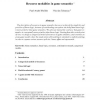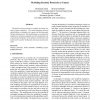140
click to vote
CIE
2010
Springer
15 years 7 months ago
2010
Springer
Game semantics provides an interactive point of view on proofs, which enables one to describe precisely their dynamical behavior during cut elimination, by considering formulas as ...
118
Voted
FOSSACS
2004
Springer
15 years 8 months ago
2004
Springer
We describe a game semantics for local names in a functional setting. It is based on a category of dialogue games acted upon by the automorphism group of the natural numbers; this ...
113
Voted
CSL
2007
Springer
15 years 9 months ago
2007
Springer
A game semantics of the (−−∗, →)-fragment of the logic of bunched implications, BI, is presented. To date, categorical models of BI have been restricted to two kinds: funct...
108
Voted
LICS
2007
IEEE
15 years 9 months ago
2007
IEEE
The description of resources in game semantics has never achieved the simplicity and precision of linear logic, because of a misleading conception: the belief that linear logic is...
107
Voted
IEEEIAS
2007
IEEE
15 years 9 months ago
2007
IEEE
We model security protocols as a game tree using concepts of game semantics. The model interprets protocol specifications as strategies over a game tree that represents the type ...
121
click to vote
TLCA
2009
Springer
15 years 9 months ago
2009
Springer
We introduce a Game Semantics where strategies are partial orders, and composition is a generalization of the merging of orders. Building on this, to bridge between Game Semantics ...
119
Voted
TLCA
2009
Springer
15 years 9 months ago
2009
Springer
G¨odel’s completeness theorem is concerned with provability, while Girard’s theorem in ludics (as well as full completeness theorems in game semantics) are concerned with proo...
157
Voted
LICS
2009
IEEE
15 years 9 months ago
2009
IEEE
Game semantics describe the interactive behavior of proofs by interpreting formulas as games on which proofs induce strategies. Such a semantics is introduced here for capturing d...


